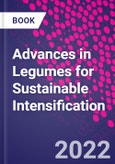Advances in Legume-based Agroecoystem for Sustainable Intensification explores current research and future strategies for ensuring capacity growth and socioeconomic improvement through the utilization of legume crop cultivation and production in the achievement of sustainability development goals (SDGs). Sections cover the role of legumes in addressing issues of food security, improving nitrogen in the environment, environmental sustainability, economic-environmentally optimized systems, the importance and impact of nitrogen, organic production, and biomass potential, legume production, biology, breeding improvement, cropping systems, and the use of legumes for eco-friendly weed management.
This book is an important resource for scientists, researchers and advanced students interested in championing the effective utilization of legumes for agronomic and ecological benefit.
Please Note: This is an On Demand product, delivery may take up to 11 working days after payment has been received.
Table of Contents
Section-I: Legumes for sustainable crop intensification
1. Legume-Based Agroecosystem for Sustainable Intensification: An overview
2. Scope for production of pulses in rice fallow lands in South Asia
3. Sustainable intensification in cropping systems through inclusion of legumes
4. Legumes for efficient utilization of summer fallow
5. Efficient utilization of rice fallow through pulse cultivation
6. Legumes for nutrient management in the cropping system
7. Residual nitrogen for succeeding crops in legume-based cropping system
8. Legumes for eco-friendly weed management in agroecosystem
Section-II: Human and animal Health
9. Grain legumes: A diversified diet for sustainable livelihood, food and nutritional security
10. Recent strategies for pulse biofortification to combat human malnutrition
11. Forage legumes for human, animals and environment
12. Legumes for animal nutrition and dietary energy
Section-III: Soil health management
13. Legumes protect the soil erosion and ecosystem services
14. Sustainable management of land degradation through legume-based cropping system
15. Legumes effect on nitrogen mineralization and microbial biomass potential in organic farming
16. Legume based inter-cropping to achieve the crop, soil and environmental health security
17. Soil carbon and legumes
18. Role of legumes in phytoremediation of heavy metals
Section-IV: Agroecosystems Management
19. Legumes for Agroecosystem Services and Sustainability
20. Potential of legume-based cropping systems for climate change adaptation and mitigation
21. Legumes to reduce ecological footprints for climate-smart cropping systems
22. Environmental footprints of legumes-based agroecosystems for sustainable development
23. Legumes for efficient utilization of summer fallow
24. Potential of tree legumes in agroforestry systems and soil conservation
25. Leguminous trees for sustainable tropical agroforestry
Section-V: Crop Improvement
26. Grain legumes: Recent advances and technological interventions
27. Current trends in genetic enhancement of legumes in the genomics era for a sustainable future
28. Conventional, genomics and post-genomics era of pulses breeding: Current Status and prospects
29. Participatory breeding for improving legume landraces in small-scale farming
30. Prospects for genome-wide selection for quantitative traits in legumes
Section-VI: Economic importance
31. Effect of legumes on nitrogen economy and budgeting in South Asia
32. Pulses production, trade and policy imperatives: A global perspective
33. Multiple pathways of legume-based systems towards environmental, social and economic sustainability in smallholder systems
34. Legumes for improving socio-economic conditions of farmers in rainfed agroecosystem�








